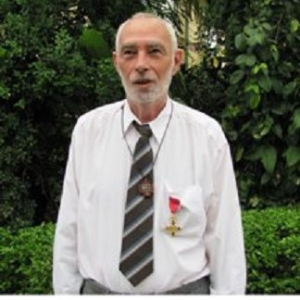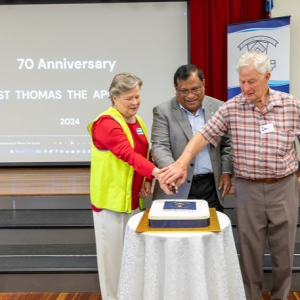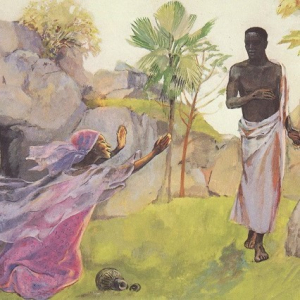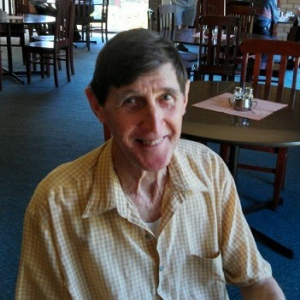Peter MALONE
Aristotle and Dante Discover the Secrets of the Universe
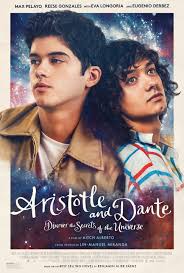
ARISTOTLE AND DANTE DISCOVER THE SECRETS OF THE UNIVERSE
US, 2023, 98 minutes, Colour.
Max Pelayo, Reese Gonzales, Veronica Falcon, Eugenio Derbez, Eva Longoria, Kevin Aleandro, Marlene Forte.
Directed by Aitch Alberto.
One of the longest titles! Intriguing, perhaps? Pretentious for others, perhaps? And bypassed audiences who are not into philosophy and literature!
This is not a venture back into the classics. We are in El Paso, Texas, 1987. Aristotle, Ari to his family and friends, is the narrator. He is 16, quite a loner, a sparse room at home, alienated from his father (Eugenio Derbez), bonding with his mother (Veronica Falcon), but better because his older brother has disappeared and his parents refuse to talk about him. He should have learned to swim but, one day at the pool, he encounters the very friendly Dante. They instantly click with each other, Dante persuading him to trust him, to float, to swim. Dante has wealthy parents, his father an academic. They are both from Mexican families.
This film is based on a Young Adult novel which proved very popular. Those in the know from the novel are aware of where the friendship is leading. Those not familiar with the novel will suspect that it is going to be coming of age, emerging awareness of sexual orientation, of relationships.
It is Dante who is really aware of his inner self, his orientation, his sensibilities, an artist, his sensitivities. Ari, on the other hand, does not relate well to many people at all, the girls at school included. But, the two enjoy their company, are welcome in each house, Dante inviting Ari to come with his parents to the beach camp, with a telescope, studying the stars in wonder, pondering the secrets of the universe.
Complications arise when Dante’s father gets a teaching job in Chicago, to be away for a year. There is a dramatic moment when Ari saves Dante’s life by pushing him away from oncoming reckless car. The screenplay then turns to letter writing, Dante very honest, inquiring, talking about kissing a girl, acknowledging his orientation. Ari is not such a good letter writer, values Dante’s letters, is at home, working in a burger joint, encountering a friendly girl who kisses him.
Then, the family arrive back for the summer break, Dante being honest, Ari reacting badly, Dante being bashed in the street, and Ari confronting his parents to discover what happened to his brother. There are happy moments for Ari, especially when his aunt visits, exuberantly praising him, but sadly dying.
There is a moving scene when Ari finally talks with his father, encouraged by his father to be himself, some hope for the future. A symbolic ending with the two boys on the back of a truck gazing at the stars, having discovered the secret of their own universe. For teenage audiences, whatever their orientation, as well as for parents to understand these questions and the effect on their children.
1. The title and expectations? The classic names? Philosophy, poetry and the universe?
2. Based on a Young Adult novel? The characters, the intended audience?
3. Texas, El Paso, the 1980s? Mexicans in El Paso, adapting to the US, Mexican traditions? Spanish language, English language? Accepted, not accepted?
4. Ari’s story, his voice-over, at 16, Mexican background, relationship with his mother, more tender, difficulties with his father, the story of his older brother and the secrecy? A loner, expressing his views, keeping to himself, at home, at school, no friends, not learning to swim, at the pool? The first encounter with Dante? Friendly, teaching how to swim, the trust, the bonding? The ability to talk with each other, share time, Dante visiting the home presenting the Mexican art book? Ari visiting Dante’s home, his parents, going on a camping trip? Accepted as part of the family?
5. Audiences knowing the gay themes and watching the developments of the characters? Audiences not knowing, intimations, development, denial, truth? Love? The secrets of the universe?
6. Dante, his academic father, the camping and the telescope, the stars, contemplating the stars? Dante’s room and its being a mess, the austerity of Ari’s room? The move to Chicago, the farewell? Dante and his letters, only not writing back so much, the issues arising, the issue of masturbation, the kissing the girl, Dante’s confession? Ari’s reaction?
7. Ari, interactions with the girls, their curiosity, sending them off? The young woman signing his cast? Meeting with the party, the kiss, his reaction?
8. On the road, the turtle, Dante, the car, Ari pushing him to safety, Dante’s injuries? Ari in hospital, chin, leg in a cast?
9. Ari’s birthday, the gift of the truck from his father, attempts to communicate with his father? Relying on his mother? His generally surly entrance into the home? Eventually asking for the truth, being overwhelmed by the truth, not being happier for knowing about the violence of his brother, his outbursts, killing the trans prostitute?
10. Ari’s return, the bond between the two, the truck, watching the horizon, talk? Dante and his wanting to talk about his orientation, the kiss, the kiss with Ari, Ari and his violent reaction? Dante, his being brutally bashed, hospital? Ari’s visit? The confrontation with the other boy, the identity of the attackers, going to Julian, the brutal outburst, the blood on him, coming home, repeating the pattern of his brother?
11. The importance of his aunt, her love for him, always praising him, enjoying his company, her death, the grief, his mother going to the home, the revelation about her being lesbian? Difficulties for the family? Ari and his acceptance? His eyes leaving him a house in her will?
12. The frank talk with his parents, with his father, their acknowledging his loving Dante, helping him to understand? The return to Dante, the kiss, acceptance?
13. The lyrical ending, fantasy, the back of the truck, floating the stars, in the middle of the secrets of the universe?
Before Dawn
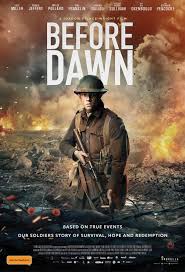
BEFORE DAWN
Australia, 2024, 99 minutes, Colour.
Levi Miller, Travis Jeffery, Ed Oxenbould, Myles Pollard, Stephen Peacocke, Oscar Millar, Pat Kelly Belinda Hammond.
Directed by Jordon Prince-Wright.
The past is often powerfully present to us. And we can understand ourselves better in the light of the past.
This is a presupposition for the continued cinema visits back to Australia’s War past. And the Anzac motto, “Lest we Forget”.
Young director, Jordon Prince-Wright, has dedicated this film to his granddad. While he is re-visiting stories often told – and we remember Gallipoli, The Lighthorsemen, Beneath Hill 60 – this is a very personal telling of Australian involvement in World War I, in France, on the Somme, the Hindenburg line and other key battle fronts from 1916 to 1918 and the Armistice.
The tone of the film is set before the credits, the darkness of the trenches, dirt, the rats, the atmosphere in which the men had to spend years. Then to a farm in Western Australia, Jim Collins (Levi Miller) working with the sheep for his father, mates with the coworkers. They are intending to go to war, eager to sign up. They want Jim with him. His father and mother don’t want him to go, the threat to managing the wrecked farm. Jim is caught but decides to go. It is 1916.
As with so many striking war films, it is amazing to see how the battlefield is reconstructed, detailed presentation of the trenches, the glimpses of the battlefields and the soldiers going over the top, attacking German posts, the men being shot down, the hand to hand combat all convincing here.
Jim is young, he has to come of age in the trenches, lose close friends, be blamed when friends are killed, personality clashes and how to deal with them, the role of the authorities, some condescending, some altering their reports out of care for the young soldiers, and the proverbial sergeant who bonds with his men, is not only a leader but something of a father-figure, sharing the crises and the action with them.
Jim is a good young man, conscientious, and shows some heroism, especially going over the top to rescue an injured man and drag him to safety. And the film indicates that this is the kind of experience that the young soldiers brought back home, if they survived, a spirit of mateship in a war that they did not necessarily understand, that was confined for years in a limited area of France. The Anzac spirit.
This is an early feature film from the director. Given the aplomb with which this film was made, it will be interesting to see his future films.
- Australian perspective on World War I, the fighting in France, 1916 -18, the trenches?
- Perspective on World War I, after more than 100 years? Recapturing the life of the young men at home, on the farms, their enthusiasm, and listing, finding themselves in France, the Somme, the Hindenburg Line, the bonding, the fighting, the mud and rats of the trench, serving up the food, the rain, time passing, the wounds and injuries, the months, the years?
- The West Australian settings? The farm, the sheep, the dam, the home? The hard work of the parents? Making ends meet? The tough father? Hard on his son? The young daughter? The mother, the reporting dirty boots in the house? Jim, his age, the work, the friendship with the group, Don, Thomas Nickles, memories of the past? The newcomers, Archie? Jim and his decision to go with the group, the hesitations, the final words from his father, the desperation for the farm, something of his father’s blessing? The sad news received when his father died?
- The picture of the warfare, the detail of life in the trenches and its hardships, the German enemy, seen and unseen? The bombardments? Going over the top? The men being killed and the attacks? The men to be rescued and brought back to the trenches? The dilemmas about leaving injured men? The dangers, the heroism?
- The picture of the authorities, their visiting the trenches, some sense of superiority, issuing orders? The interviews with the officer?
- The sergeant, his personality, authority, with the men, companionship, understanding, making judgements for the situations, following orders?
- The years and their effect on Jim, initially young and naive, collaborations, Don, the friendship from the past, his going over the top, his death? Nickles blaming Jim? The fights, cantankerous? Eventually Nickles being wounded, Jim and his support? Their surviving?
- The detailing of the young men, their personalities, friendships, dangers, deaths? Archie, young, fears? Winding?
- The passing of time, the months, then the years? The effect of such a long warfare, the life in the trenches? The confrontation with the Germans, attacking the posts, grenades, hand-to-hand combat, the killing of the Germans? The effect on the men?
- 1918, Armistice Day, the silence after the guns, the checking of the time, the relief, the joy, the comradeship?
- Jim, his return home, his sister, his mother, his father’s grave?
- The director dedicating the film to his grandfather? A reminder of the impact of the men going to war, the many deaths, the legacy of the war on Australian society?
Io Capitano
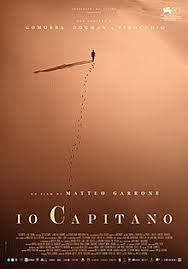
IO CAPITANO
Italy, 2023, 121 minutes, Colour.
Seydou Sarr, Moustapha Fall, Issaka Sawadogo.
Directed by Matteo Garrone.
A film that needs to be seen.
Audiences all around the world have experienced refugees, asylum seekers, trying to come to their country, especially refugees at the mercy of people smugglers. For years there have been images of boats capsising in the Mediterranean, journeys from Libya, hopes for reaching Italy. And, during the 2010s, the many stories, in fact, the many films, featuring the refugees from Afghanistan, Syria, again reaching the Mediterranean, attempts to reach Greece, difficult treks through Europe, borders barriers, hostile reception, racism.
But, there have not been so many films about the refugees and their journey through the countries of North Africa to get to Libya, to make that journey across the Mediterranean.
The two central characters, cousins, age 16, at school, doing odd jobs to get money for their passage to Europe, Seydou and Moustapha, using their actual names never having acted before (which makes their performances all the more credible and persuasive), have dreams of life in Europe, in Italy. The mother does not want them to go but they go to get a passport, from the people smugglers, and a perilous journey begins.
The early part of the film does show life in Senegal, school, family, hard work, and the desire for something better. But, the central part of the film shows the journey – and it is definitely not better. The hopeful refugees are bundled into vehicles, crammed, at one stage on the back of a truck bouncing on the dunes, someone falling off, the convoy driving off, the falling man abandoned. At times, the desert is no place for any vehicle and the group have to trek for days, a relentless guide leading them, some collapsing, especially a woman whom Seydou tries to help, but the group has to go on (and, revealing his character, a dream fantasy where he goes back to rescue the woman and she is able to fly to safety).
The trek takes them inland from the Senegalese coast to the border with Niger, payments to corrupt officials, through the desert then to the Libyan border. But the Libyan border has been a false hope. By this stage, the group is weary, even the two young men. And, as we have travelled with them, we are weary, upset, concerned for them. And worse is to come,
Again the border guards are corrupt, checking passports (with full state two years earlier but the guards noting that the boys are wearing the same clothes now as in the passport), demanding money, Moustapha arrested and taken away. Then over the operations of the Libyan Mafia. Seydou is also taken, imprisoned, tortured because he has no money. But, a saving grace, an order refugee, Martin, encouraging Seydou, tending his wounds, volunteering when builders are asked for and nominating Seydou.
Some respite as the couple build a wall, the commission to build a fountain in the grounds of the desert mansion, and freedom to leave. There is more to come, Seydou doing jobs but searching for Moustapha, finding him, approaching the people smugglers and their still dreaming of life in Italy.
One aspect of the story of the boats on the Mediterranean is the smugglers getting the youngsters to steer the boats, perhaps more tolerance of the boats by the Italian Coast Guard. Which means then that Seydou after brief instructions about gears and guidance, is the Captain, Io Capitano. Some exhilaration for him but also a great discovery of responsibility, passengers, pregnant woman, Moustapha and his wounded leg, passing the lights of oil rigs, and eventually the Italian coast.
The film ends. We have shared the journey. And we know the hardships that the entry into Europe will bring.
1. A topical film? The 2010 this? The 2020s? Migrants on the move around the world? From Africa to Europe?
2. The settings in darker, life in Senegal, the city, homes, families, all conditions, crowded houses, boys and labour, school, collecting money for the trip to Europe? The dream of Europe?
3. The establishing of the characters, Seydou, leadership, Moustapha, cousin, supportive? Seydou at home, asleep, his sisters, his mother, working on the building site, going to school, testing out his mother about leaving, her harsh reaction? Counting the money? Moustapha, age, enthusiasm?
4. Decision to go, the religious consultation, the rituals, the shaman, his approval? Getting the passports, the big lineup, rapidity, the photos, the money, later the lie about the date of the passports and their wearing the same clothes?
5. Leaving, the vehicles, the characters of the people smugglers, exploitation?
6. The trek, the terrain, from Senegal inland, through Mali, to the border with the Niger, the treatment, the hustling, checking, the trucks, the drive through the desert, bouncing, the man falling off the truck and abandoned, the lady who could not go on, Seydou’s return, trying to help, the dilemma, Moustapha urging him, his later dream about helping the woman to fly?
7. The Libyan border, the police, searching for money, Moustapha and his inserting his money in his body, his arrest, imprisonment?
8. The Libyan Mafia, taking the refugees prisoner, the torture and details, Seydou, the others hanging? In the cell, the crowds, Seydou and his exhaustion, taken pity on by Martin, Martin and his back story, the appeal for builders, Martin volunteering but taking Seydou? Into the building site, the food, some accommodation, building the wall, the manager, the issue of building the Fountain, must of freedom, the work on the Fountain, it being accepted?
9. Seydou, Martin, in Tripoli, Martin having to leave, going to Italy? Seydou’s gratitude, his saving his life? Seydou, work, continuing to search for Moustapha, eventually finding him, Moustapha having been shot, the doctor and the injection, the barber and his drugs? The doctor advising that they needed to go to Italy?
10. Seydou, the people smugglers, not enough money, the smuggler and his suggestion that Seydou guide the boat, the boat itself, the explanation about the gears of the engine, Seydou and his diffidence, yet wanting to help, time for Moustapha? The crowds on the boat, discovering the men in the engine room, the pregnant woman, the crowds, water, atmosphere?
11. Seydou, guiding the boat, high hopes, Moustapha assisting him, the oil rig, the lights, continuing on, Seydou and the crisis, controlling the people, the birth of the child? At the wheel, declaring that he was the captain, that it was saving people? Sighting land, the helicopter, the birds flying?
12. Seydou, the achievement, the long close-up on his face, the Captain?
13. The film of contemporary issues, Italian directors and his perspectives, the stories he had heard, his career, the cast and their first films, convincing, struggle, humanity, venturing into the unknown, naivete, the future?
American Fiction
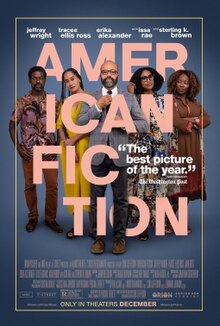
AMERICAN FICTION
US, 2023, 117 minutes, Colour.
Jeffrey Wright, Sterling K.Brown, Issa Rae, Erika Alexander, Tracee Ellis Ross, John Ortiz, Leslie Uggams, Adam Brody, Keith David, Myra Lucretia Taylor, Raymond Anthony Thomas.
Directed by Cord Jefferson.
Quite a generalised title and audiences will have their own ideas of what American fiction is, whether they like it or not. With this humorous, satiric story, there is a lot to like, as well as a great deal of disapproval!
American Fiction was nominated for five Academy Awards, including Best Film, Best Actor, Best Supporting Actor, music – and winning for Best adapted screenplay by the director, Cord Jefferson. So, quite some standing amongst the American films of 2023.
We are introduced to Thelonious Ellison (and his nickname, Monk, after the musician). He is played by Jeffrey Wright, Oscar nominee. He lectures at the University, has written books, can be a stuffy academic, disdainful when he listens to a reading by a successful novelist, using the language and jargon of the streets to illustrate African-American life. He thinks that this is destined to appeal to the consciences of one people.
Monk is alienated from his family, though bonding with his sister who, sadly dies. His mother is becoming senile and the issue of the aged care. His plastic surgeon, gay brother, Oscar nominee Sterling K.Brown. Which brings him back to his family life, not very happy about it, but very attracted to Coraline who lives across the street, beginning a relationship with her. But she will feel the effect of his crankiness.
And, Monk is cranky with his publisher, upset at lack of progress with his own books, then getting the mischievous idea to write an anonymous parody of the kind of book he loathes. They create an anonymous author, a former prisoner, background, not well educated… And, his dismay when publishing agents enthusiastically praise the manuscript, huge advance payment, want instant publication, Hollywood after the film rights. And his surly assertion for a four letter title – which is accepted.
And his friend likes the book, praising it, furthering his crankiness.
He is also a member of a book judging committee, having discussions with the author of the book he loathed who makes some interesting comments about his, not knowing he was the author. The publishers then enter his book into the competition and, of course, in a climax scene at a banquet, he is the winner.
Tongue goes firmly into cheek for the final part of the film, the discussion with the Hollywood producer, discussions about all kinds of possible endings – which are visualised for us. But, will Monk succumb to success and popularity, or…?
And for non-Americans, enjoyable to see Americans sending themselves up!
1. The focus on American literature, American fiction, Afro-American fiction, serious, popular, academic interpretations,?
2. The opening, introducing Theolnious Ellison, nickname Monk, age, endemic position, lectures, attitude towards literature, discussions with the students, Flannery O’Connor, the discussion about the word “negative”, student walking out? The discussion with the Dean, complaints against Monk, his going to Boston, attitude towards his family, suggested that he take time off? The prospect of his new book? His past books, academic, well reviewed, not red?
3. Monk going to Boston, meeting Lisa, revelations about the past, his father’s favourite, the rule of his father, doctor, Lisa and Clifford being doctors, going to visit their mother, her presence, personality, beginnings of senility?
4. The panel, the few people attending? Hispresence at Sentara Golden’s reading, the acclaim, standing ovation, his puzzle, her book, the title, popular African-American language, content?
5. Lisa, her collapse, her death, the funeral, their mother, Cliff arriving, is attitude, from Phoenix, plastic surgeon, the clashes with Monk? The issue of his sexual orientation, marriage breakup, lover, whether his father knew? His mother’s saying she was glad he was not gay?
6. Monk and is meeting with Arthur, promoting his books, the conversation, is one and his exasperation with the popular literature, for black audiences, for white audiences, their sense of guilt, feeling the need to read such books, their interpretation?
7. His decision to write the book, imagining the situations, the confrontation between the characters, their asking him for advice, setting up the situations – a quick device for establishing the writing of the book? Taking it to Arthur, his reaction? The decision to send it out? The publishers, their acceptance, rave comments, the huge money advance, the impact on Monk, the phone calls, the PR buildups, Arthur urging Monk to assume the author’s character, tone of voice, vocabulary? Monk and his hesitation? Decision for it to go ahead? The film offer? The meeting with Wylie, the false background, his being a fugitive, prison sentence, telling his story on his own style?
8. The complications for monk with his mother, Lisa having helped, money issues, Cliff not having money, the reliance on Lorraine, her devotion to the family, to Agnes, to Monk? Maynard, the police, the past friendship, Lorraine and Maynard as a couple, the proposal? The visits to the aged care home, Agnes’s reactions, moving in, emptying the house, souvenirs for Lorraine? That they would movie in after the wedding?
9. Monk, the encounter with Coraline, helping with the groceries, her ex-husband, the growing friendship, conversations, her having read his books, the relationship? Her coming to meals, the across the street? The bonding? A humane outlet for Monk?
10. The publication of the book, the issue of the cover, the issue of the title, Monk and his proposing Fuck, initial reactions, the decision? The publication, the acclaim, popularity, sales? The film rights? Wylie, the meeting, the ambulance for his mother, rushing out, wildly interpreting this is his apprehensive is about the police? Adding to the credibility?
11. Coraline reading the book, Monk and his negative reactions, the clash?
12. The competition, the request to Monk to be on the panel, Sentara Golden on the panel, the other members, white, the range of books, discussion about reading the first hundred pages? Sentara and her dislike of Fuck? Monk warming to her, but the clash and the argument?
13. The buildup to the awards, the invitation to Coraline? Announcing the winner, the acclaim?
14. The ending of the film, creative fiction, one going to the podium, taking the trophy, but the variety of possible endings, discussing them with Wylie for the film, speculations? Acceptance, Coraline, the speech, the reconciliations all round, the speculation that the police had identified the author, fugitive, the police invasion, the shootout?
15. The serious dimensions about American literature, images? The satirical take on American fiction?
RIP, Paul Jennings MSC.
RIP, Paul Jennings MSC.
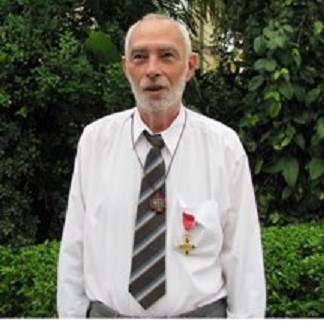
Peter Hendriks writes: Paul passed away early this morning at 12:47 am. Peter Guy and Catherine visited him yesterday afternoon and said that Paul was very lucid and chatty. Peter stayed on until late in the evening. At 7:00 pm Paul went into a deep sleep and died peacefully this morning. He appreciated everyone’s prayers that were being said for him. Paul, may you enjoy your eternal rest with our God of love.
Paul Jennings made his first vows as an MSC on February 26th 1962, studied at the Sacred Heart Monasteries, Canberra and Croydon.. He was ordained on August 29th 1970.
Paul worked in education in Papua New Guinea for most of his life as a priest, since 1971.
However, he became the first Councillor to Brian Gallagher during his time of Provincial, 1993-1998. He then continued in this role for three years for Bob Irwin.
The most recent memory of Paul for many of us - at last year's Chapter
He was a long serving Headmaster of Sacred Heart High School at Hagita, in Milne Bay, for 12 years and at the same time worked on several Department of Education committees in curriculum and teacher capacity building. He was a member of the Ministerial “Matane Commission” in 1986 and 1987 which was tasked with developing a home grown philosophy of education for Papua New Guinea and mapping a way forward for a restructure of the whole education system.
He was Executive Director of St Joseph’s International Catholic College in Port Moresby, Chair of the Governing Council of a new Sacred Heart Teachers College which specialises in recruiting and training Primary teachers for remote and isolated schools; a member of the National Catholic Education Board and an advisor to several government education committees. He is also completing writing a revised curriculum for Upper secondary Religious Education for catholic schools in Papua New Guinea.

Paul was awarded an OBE by the Government of Papua New Guinea in the Queen’s birthday honours list, for services to education and the Church in Milne Bay and Papua New Guinea.
St Thomas Parish, Blackburn, 70 years’ celebration.
St Thomas Parish, Blackburn, 70 years’ celebration.
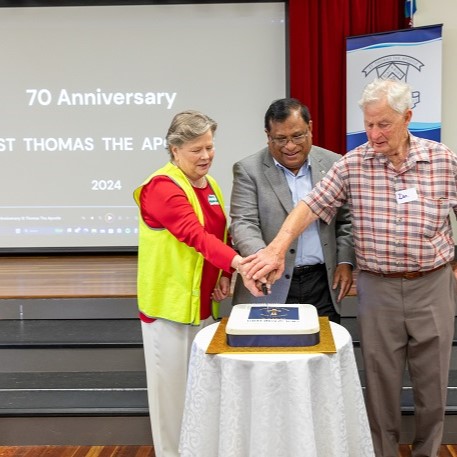
This is the 17th year of MSC service, so, almost a quarter of the history of the parish.
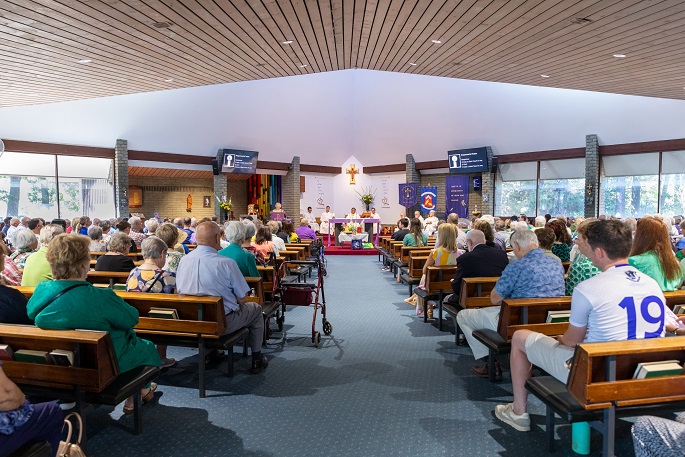
The parish is also the location for MSC Formation since 2009. Our parish priests have been Chris Murphy, Terry Bowman, Alo Lamere.
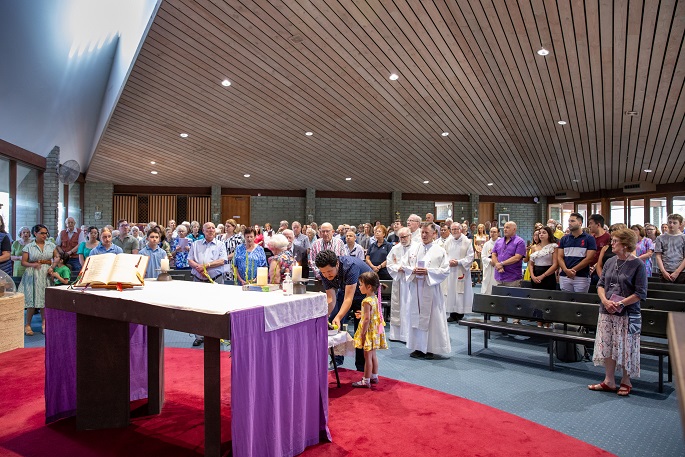
Our students and formation director live in Cuskelly House, Formators live in Naughton House and the novices at 77 Central Road where Brian Gallagher lived before moving into St Thomas’ care in nearby Forest Hill.
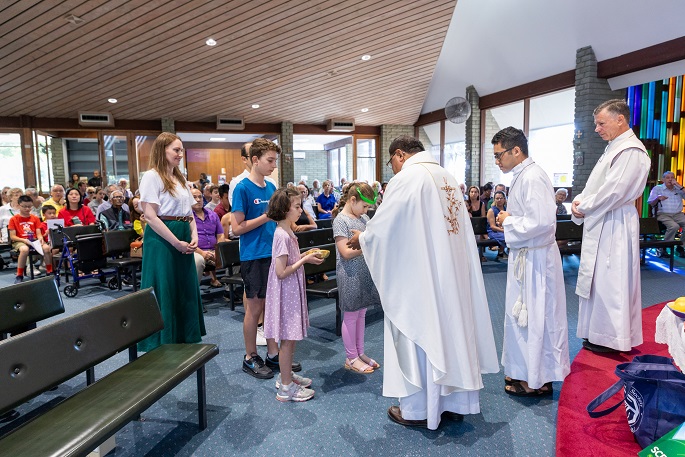
The celebration was the 10.30 parish mass on March 17th. Celebrants were Alo, Mark Hanns, Khoi Nguyen
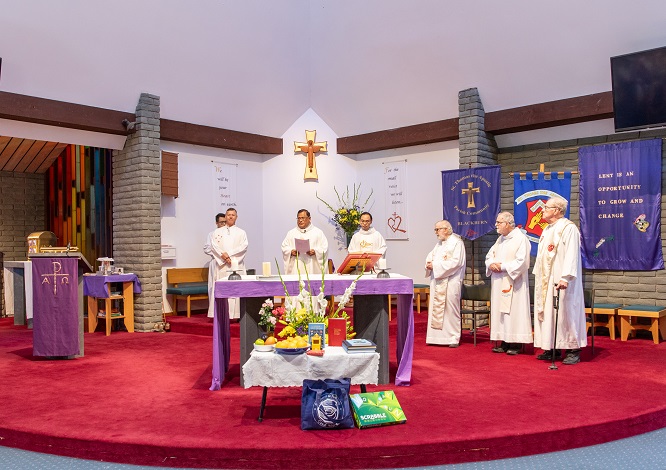
and the invitation to Paul Castley, Peter Malone, Philip Malone to concelebrate to acknowledge their contribution to parish supply at St Thomas.
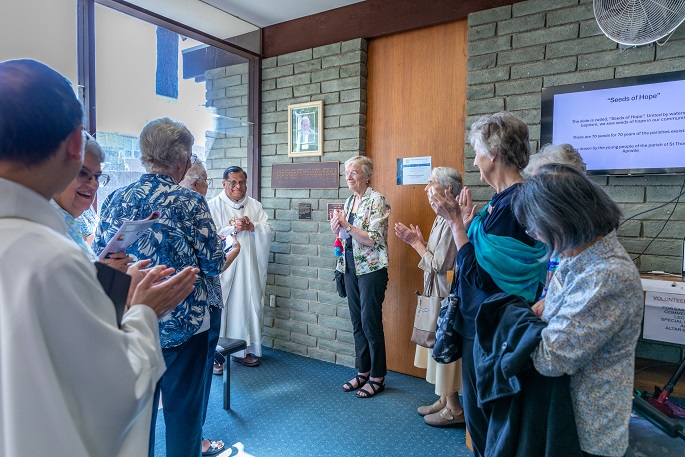
A plaque was dedicated to acknowledge the presence of the Loreto sisters in the parish.
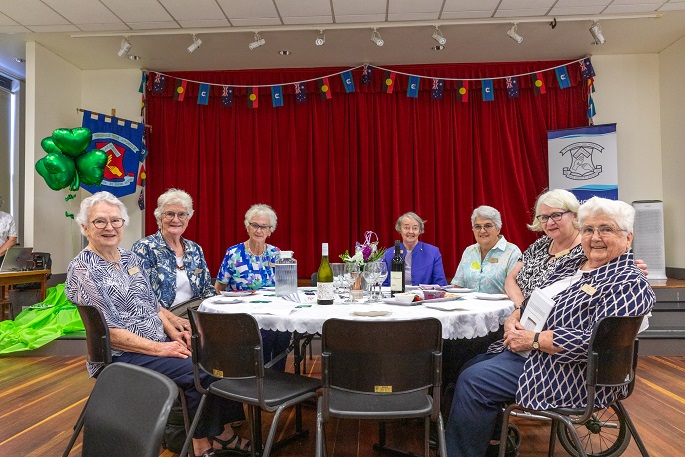
The group of Loreto Sisters
The parish then hosted a sit-down lunch in the school hall (with tours of the school for past students and visitors).
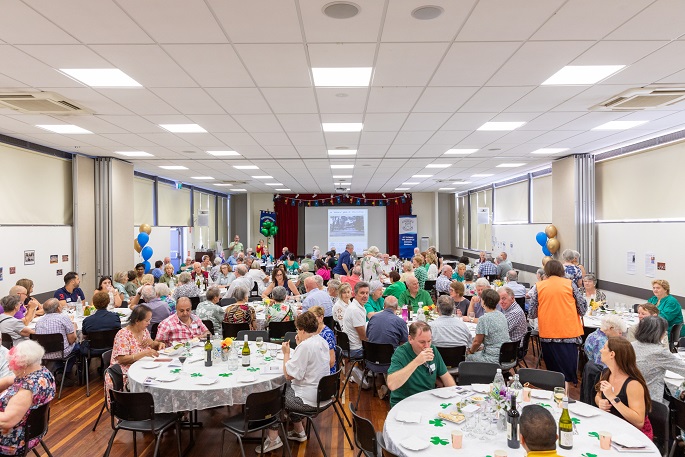
Such were the numbers at the lunch that extra tables were set in a marquee in the school grounds.
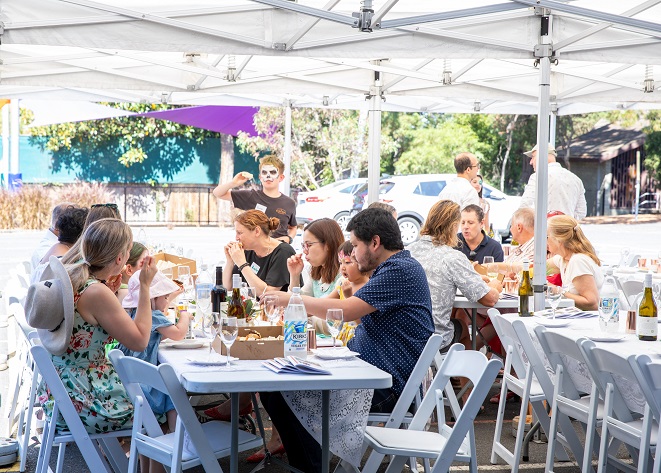
Speeches, videos of interviews, history quizzes during the lunch, a booklet with testimonies from parishioners, a happy celebration.
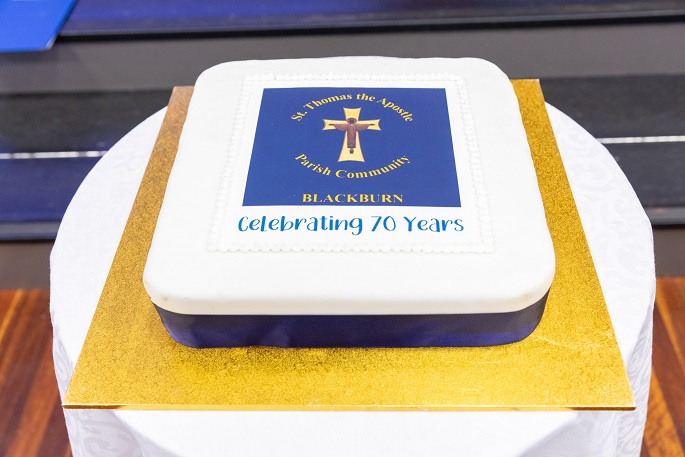
Easter Monday lightness – with something heavy!
Easter Monday lightness – with something heavy!

For fuller view see below
Downlands College (some MSC heritage). Toowoomba school students have smashed the record for Queensland's heaviest pumpkin at this year's Royal Queensland Show giant pumpkin competition.
Downlands College year 10 and 11 agricultural science students grew and displayed an Atlantic giant pumpkin which weighed in at 368.5 kilograms at the Brisbane Showgrounds on Saturday.
They beat the previous Ekka record, set in 2015, by 107kg.
The college had two entries this year, and amazingly their lightest still weighed 337.5kg.
Last year, Downlands became the first school in the competition's 147-year history to win the top title.
- In short: Toowoomba students have beaten the previous Ekka heaviest pumpkin record, set in 2015, by 107kg.
- The Downlands College pumpkin weighed 368.5kg.
- What's next? The school aims to beat the national and world records which sit at more than 800kg and 1,200kg respectively.
_________________________________________________________________________

And a recent PS: Downlands break hoodoo to win AFLQ Darling Downs ‘holy grail’
Congratulations to our Under 17s Girls on securing the premiership this AFL season!
“The girls have come from all over Australia as boarding students to our school, some of them have been in the side for three or four years where we’ve made grand finals every year and never quite got the result,” Mr Dan Fraser (coach) said. But, now…
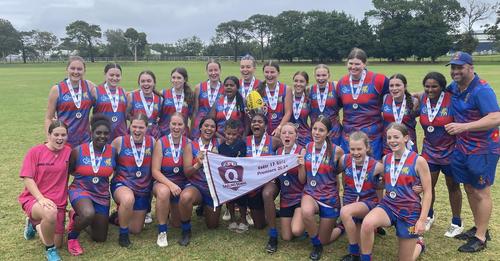
Celebrating Jesus Risen-with Mary Magdalene
Celebrating Jesus Risen-with Mary Magdalene
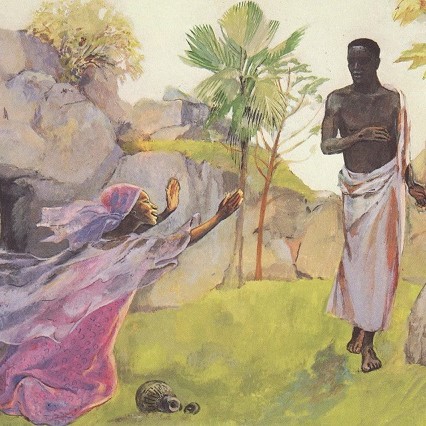
An interpretation from Maryknoll Lay Missioners.
Mary Magdalene was one of the group of women who followed Jesus and the apostles and looked after them.
Mary Magdalene was at the foot of the cross – unlike Peter who had denied three times that he knew Jesus and then fled and hid in the upper room.
On the third day, it was Mary who first ventured out, discovered Jesus’ body was missing, went in search, mistook Jesus for the gardener, not seeing him clearly. She expressed her concern, her worry and was rewarded by the first word of the risen Jesus, her name, “Mary”.
Delighted, she wanted to cling to Jesus but he said, “you have to let me go”.

From the 2019 film, Mary Magdalene, with Rooney Mara as Mary and Joaquin Phoenix as Jesus
Then, the first mission of announcing the resurrection of Jesus, Mary the first apostle of the resurrection, her immediate mission to give the good news to Peter and the apostles. Impetuous Peter, more than perhaps feelings of shame, ran to the tomb, deferred to by John, their discovering the resurrection for themselves.
In recent times, there has been a strong acknowledgement of Mary Magdalene as the apostle of the resurrection – before the Twelve, before Paul.
Since the 1970s, around the world there has been a growing awareness (taking a long, long time) of the status of women, female-male equality, though certainly not yet achieved.
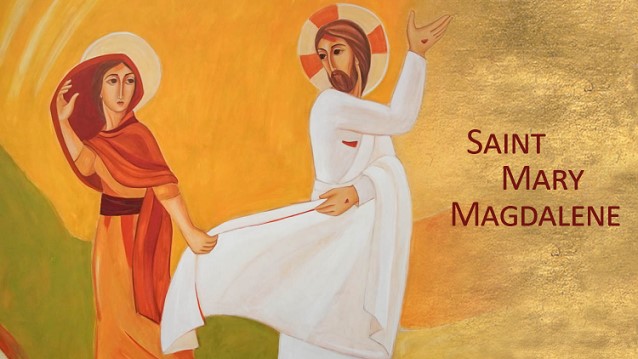
From the Vatican
Mary Magdalene, the apostle, can be seen as an apostle of Jesus pre-eminent because of the Resurrection. She offers a pattern – initiative in looking for Jesus, rewarded by finding him, recognised by him, by name, and the commission to tell Peter (interesting and challenging for 21st-century women and successors of Peter!).
EASTER BLESSINGS TO ALL OUR VISITORS
Good Friday, sharing Jesus’ death, RIP memories, Mary Conlan OLSH, Bernadetta Robinson OLSH
Good Friday, sharing Jesus’ death, RIP memories, Mary Conlan OLSH, Bernadetta Robinson OLSH
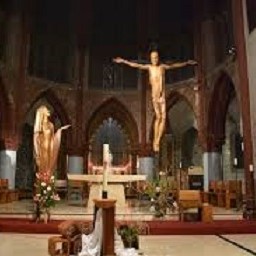
We post the memories of our OLSH sisters – and their eulogies offer fine tributes to dedication and record missionary memories of NT, PNG, Kiribati.
Eulogy: Sr Mary Conlan (17.08.1929 - 30.12.2023)
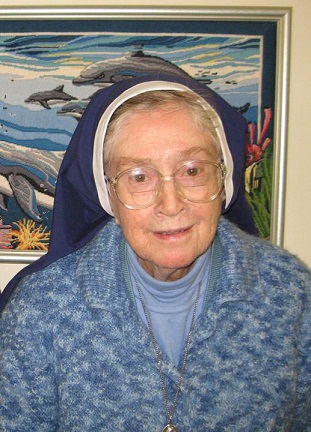
‘Mission is a passion for Jesus and at the same time a passion for his people.’ Pope Francis
These words from Pope Francis capture well the driving force behind our dear Sister, Mary who had absolute confidence in the one who called her into life and loved her unconditionally. On Saturday 30th December our much-loved Sister, Mary, gently slipped into the loving embrace of the one who had been her light, her strength, her passion, throughout her 94 years. She was 75 years professed.
To Mary’s siblings, Margaret, Dennis and Frank and their families and all her relatives and friends, who loved her so much and are deeply saddened by her death, we offer our deepest sympathy and the support of our prayers. You know well her deep love for you, her pride and joy in you, and her gratitude to you. We also offer sympathy to those who join via live streaming us from around Australia and the world.
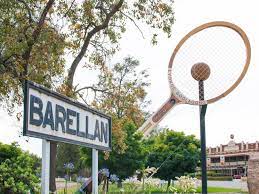
Mary Gwendoline Conlan, was born in Barellan, NSW, on 17th August 1929, to Minnie and Rueben. She was the fifth child in a family of five boys and three girls. Mary came from a loving family and enjoyed living in a close-knit farming community, where she learnt to work hard and be grateful for all she had. Growing up during the depression and war years was a struggle for her parents. There was also droughts and money was scarce. Religion played a big part in her family. Her mother taught the children catechetics after school, the family prayed the rosary every night and looked forward to Mass which was held once a month.
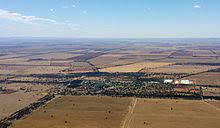
Mary didn’t have far to travel to the one teacher primary school she attended as it was on the Conlan family farm. She attended secondary school with the Josephite Sisters spending a year as a border at the Josephite school in Goulburn. As a young woman Mary enjoyed reading the Annals and Far East magazines and it was at this time she felt called to religious life.
Mary was a decisive woman and on leaving school she was convinced that Jesus was calling her to follow him in religious life as a missionary Sister; upon finishing school she entered the Novitiate at Bowral on 15th August 1946 and made her first vows in July 1948. She was given the name, Sr Mary Cajetan.
Thus, began Mary’s lifelong ministry and her epic journey as a passionate, enthusiastic educator and missionary. After completing teacher training Mary began a journey of the heart, a journey that left from Sydney Harbour on board the Matilda with streamers flying to the shores of PNG, the place she called home for over 50 years with the people she loved. In 1952 aged 22, Mary set off by boat with Sisters, Damien Philben, Joan Donnelly, Doreen Clark and Immaculata Mazengarb who were returning to PNG. After 8 days they arrived in Sideia and finally reached their destination Rabaul on 6th February. Despite the challenges of extreme heat, lack of resources, Mary felt a sense of deep peace as she realised her heart’s desire to be a Missionary as a Daughter of Our Lady of the Sacred Heart.
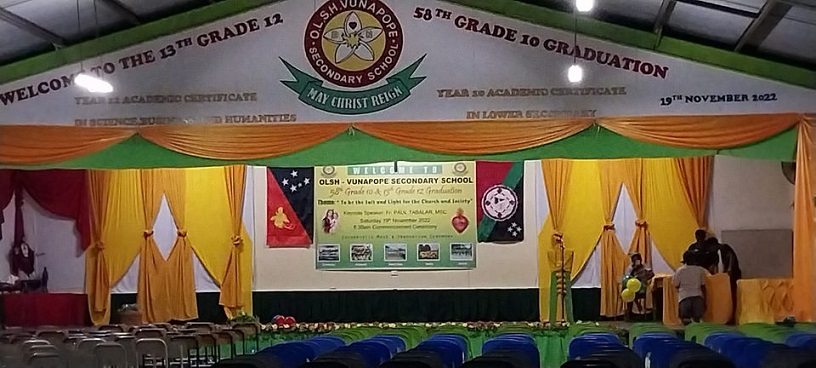
Vunapope 2021
During her years in PNG, Mary’s ministry was mainly in education, she spent a short time in Vunapope before moving to Kilenge where she taught years 1 – 6 as the only teacher in the school, teaching first in Pidgin until the students learnt English. Conditions were harsh and equipment was sparse. Mary spent 8 years in Kilenge where she got to know the people so well. Mary describes the people as being ‘gentle and peaceful who taught me so much’ Mary continued her teaching apostolate in Primary schools at Rabaul, Kaliai, Paparatava and several schools in surrounding outstations.
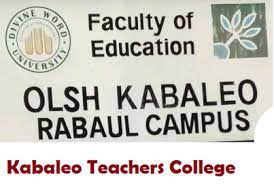
In 1967 Mary went on to teach at Kabaleo Demonstration School, not long after her arrival a strong earthquake hit the area and the Sisters had to be evacuated to Vunapope where they continued teaching until the damaged areas of the school in Kabaleo were repaired. Mary was later appointed to Rabaul where her apostolate was Pastoral Care, where she supported the women in the town. Mary had a heart for the poor and spent much time visiting and providing food to prisoners.
In 1979, when Mary came to Sydney for medical appointments she undertook training in Sewing and Carpentry. When she returned to PNG she convinced the Parish Priest to let her use the Church Hall in Rabaul; this she turned into classrooms, a workshop and a sewing room. She raised money and bought tools, sewing machines and materials and received donations from Vunapope timber yard and local stores. Sr Madeleni, (Leni) a lovely, gentle Dutch sister came from Holland to help Mary and to teach home making. And Mater Dei School was born. In the mornings there were correspondence classes, taught by Mary and a few PNG teachers in Grade 7 basics, English, Maths, Social Science and Commerce and in the afternoons Mary taught the boys carpentry and Leni taught the girls Home Economics and sewing. Whatever they made was sold to buy more materials to work with. Many girls and boys gained their Grade 10 certificates after 4 years with Mary, Leni and the PNG teachers now working with them. This allowed the students to go for further training or to get an apprenticeship. Mary was so proud of them and what they had achieved.
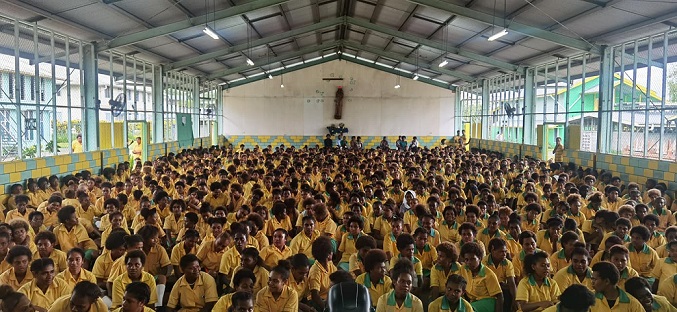
Vunapope 2021
By the time Mary left PNG in 2005, Mater Dei was a Government recognised Vocational school with a fully paid staff and a working Board of Governors and Parents and Friends.
Countless PNG students who would not have been able to continue their education were enabled to do so because of the persevering, dedicated, persistent single-mindedness of Sister Mary Conlan who treated obstacles as opportunities to progress. It didn’t matter who said “no” to Mary, she would laugh and go off and find another way around the problem.
Mary was an amazing missionary Sister, a truly remarkable woman. She made many friends among the local people and she kept in contact with them as long as she was able. Mary was most proud when she left PNG in 2005, a local couple Angela and Pius took responsibility for the Mater Dei School. Sr Mary was a faithful, prayerful religious and always true to her vocation as a Daughter of Our Lady of the Sacred Heart. She drew her strength from her deep desire to love as Jesus loved, excluding no one, especially the poor and marginalised who held a special place in her heart.
When Mary returned to Australia she joined the Maristella Community at Kensington in Sydney. In 2016 Mary’s eyesight was failing, this was a time of suffering for our dear Mary. Mary accepted her suffering and moved to St Joseph’s Residential Aged Care where she was beautifully cared for until her death.
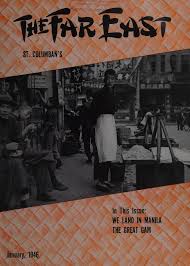
The seed of Mary’s missionary vocation sown whilst reading the Annals and Far East Magazines and praying the rosary daily with her family certainly grew into a vocation of love. What a gift God gave to the people of PNG in Mary! And what a gift the people of PNG gave to Mary as she wrote, speaking about her life in PNG; ‘I am deeply grateful to God when I look back on my life in PNG I have learnt so much from the people with whom I lived and worked. May God continue to bless them all.’
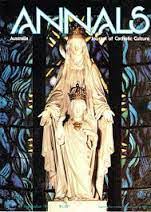
We thank God for the many gifts given to Sr Mary. We will be ever grateful to Minnie and Rueben and the Conlan family for the gift of Mary to our Congregation!
Sr Philippa Murphy
Provincial Leader
______________________________________
Eulogy: Sr Bernadetta Robinson (16.06.1935 - 7.3.2024)
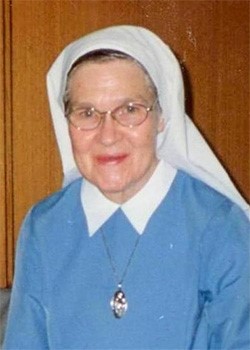
May the Sacred Heart of Jesus be Everywhere Loved!
‘This is my beloved in whom I am well pleased’.
These words from the Gospel of Matthew capture well the driving force behind our dear Sister Bernadetta’s life. She had an absolute trust and deep faith in God. On Thursday, 7th March she came face to face with her God whom she had so lovingly and faithfully served as a Daughter of Our Lady of the Sacred Heart, for over six decades.
To Bernadetta’s brothers David and John, her nieces, and nephews and all of Bernadetta’s family and friends, who loved her so much and who are deeply saddened by her death, we offer our deep sympathy and love. You know well her deep love for you, her pride and joy in you, and her gratitude to you.
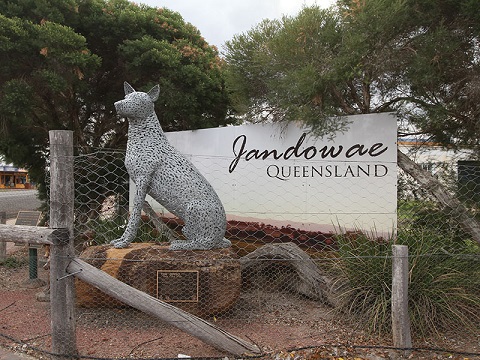
Bernadetta as we called her, was born Lorinda Winifred Robinson, in Jandowae, Queensland on the 16th June 1935 to Frank and Nancy Robinson, the third of four children. Being the only girl, she was special in the family. Her parents married during the Depression, and she grew up during the difficult war years and like many families in rural areas they faced various financial struggles. Bernadetta’s father was an Auctioneer and a Real Estate agent in the local town and her mother was a beautiful home maker. Bernadetta liked growing up in a country town, she loved animals, especially dogs and enjoyed playing sport against girls from neighbouring country towns. From an early age Bernadetta had a heart for those in need and was a member of the Junior Red Cross.
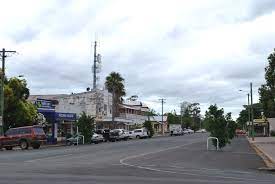
Bernadetta began her schooling at Jandowae State School and completed her studies with the Mercy Sisters at All Hallows School, Brisbane where she boarded for four years. It was here that her desire to give her life in service to God and God’s people grew. She wanted to be a missionary and it was during a three-day school retreat that she expressed this desire to a priest. The priest directed her to contact the Daughters of Our Lady of the Sacred Heart at Corinda where he had an aunt, Sister Mary Ines.
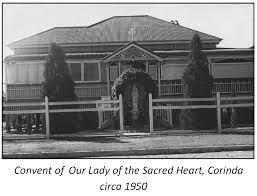
Some years later she applied to Kensington to enter the Congregation and she received a reply from Mother Concepta who suggested she make arrangements to enter on November 21st, 1954 and this she did. She made her first profession in July 1956, and was given the name, Sister Bernadetta.
These years were tinged with difficulties because her father, who was not a Catholic, and had no knowledge of Religious Life, was initially opposed to her entering, and wanted her to wait until she was 21. Bernadetta, a decisive and quietly determined young women at 19, could wait no longer. Her father went along with her decision, although initially disappointed, in later years when he saw how happy she was, his attitude changed.
As a young Sister, it was evident that Bernadetta had exceptional leadership qualities. She was welcoming, kind, inclusive, decisive, a wise steward of the Province’s resources. And she had a deep faith in God and love for Our Lady of the Sacred Heart. Over many years Bernadetta held a position of leadership as either Provincial Councillor, Provincial Bursar or Community Leader. In 1988, her dream to be a Missionary was realised and she was appointed as the third Regional Leader in the Philippines.
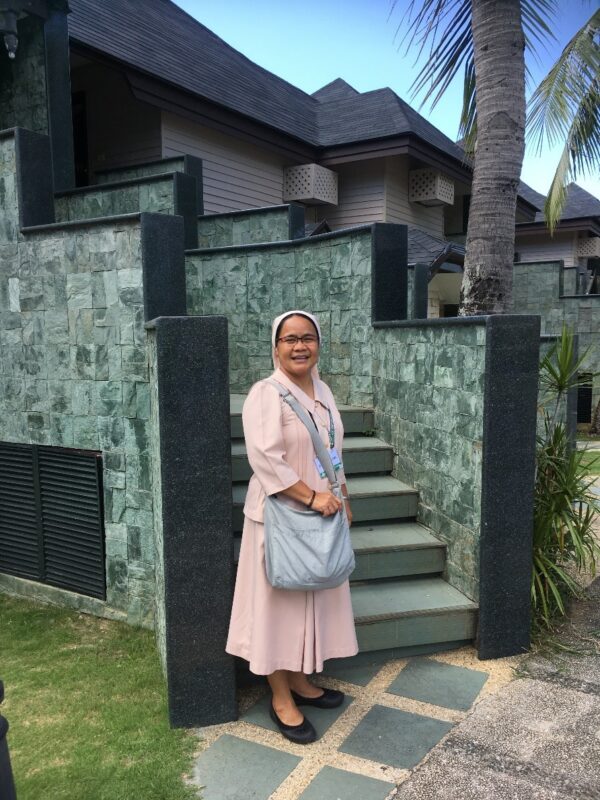
Sister Bernadetta's current successor as regional superior, Sister Ruth S. Yburan
She is remembered by our Filipina sisters as a gentle and compassionate leader, always ready to listen, and as one Sister commented: ‘That's why, some of us, young sisters at the time, understood more what true freedom was. We were able to approach her and talk to her about our dreams as well as concerns’. Her gentle, kindly and commonsense approach enriched the communities in which she lived, while her joyful, welcoming smile and unfailing graciousness made those communities places of warmth and hospitality. She was such a compassionate and gracious person, whoever came to her had her whole attention, she was constantly aware of those little things which could enrich the sisters' lives.’
Bernadetta was just a lovely, lovely person, a woman of integrity, who lived her entire religious life as a whole-hearted gift to God and God’s people, quietly and without fuss. Bernadetta drew her strength from her deep desire to love as God loves excluding no one.
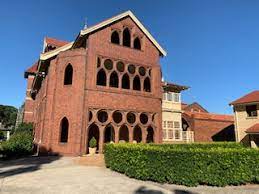
Over several years Bernadetta was the community leader in our Aged Care Community, St Joseph’s, here at Kensington. The Sisters experienced a gentle, loving, and caring leader for whom nothing was a problem and who anticipated their needs and ensured they were fulfilled. She ensured that spiritual support, so necessary for this stage of their life journey, was always available to them.
Her contented, grateful, and gracious manner was never so evident as in more recent years when her own health and strength were failing, and she herself became a resident at St Joseph’s. Whenever you visited her she would greet you with the most beautiful smile, so indicative of her inner joy. We thank the sisters and staff of St. Joseph’s who lovingly cared for Bernadetta until her death.
We will be ever grateful to Frank, Nancy, and the Robinson family for the gift of Bernadetta to our Congregation!
Go in peace dear Bernadetta united with your beloved who loved you into life and says, ‘This is my beloved in whom I am well pleased’.
Thank you for your joyful, gentle presence, your kindness, and for your beautiful smile that lit up our hearts.
May your gracious soul rest in peace.
Philippa Murphy fdnsc
14th March 2024
Acknowledging Peter Harvey-Jackson MSC, 85
Acknowledging Peter Harvey-Jackson MSC, 85
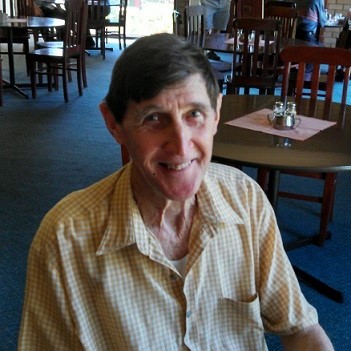
Saturday 30th is the 85th birthday of Peter Harvey-Jackson, born in 1939. Peter went to primary school at OLSH College, Bowral, then to St Stanislaus College, Bathurst. He made his first profession on February 26th, 1957 – so 62 years of MSC life and ministry.
Amongst the communities where he served are Chevalier College, Sacred Heart Monastery Croydon, Kew Community Melbourne - where he worked with the Lay MSC, Treand House, St Mary’s Towers Douglas Park, and superior of the Sacred Heart Monastery, Kensington. He also served on the Provincial Council.
For many years he worked in the Mission of Eastern Papua.
He also studied theology at the Yarra Theological Union and in Dublin.
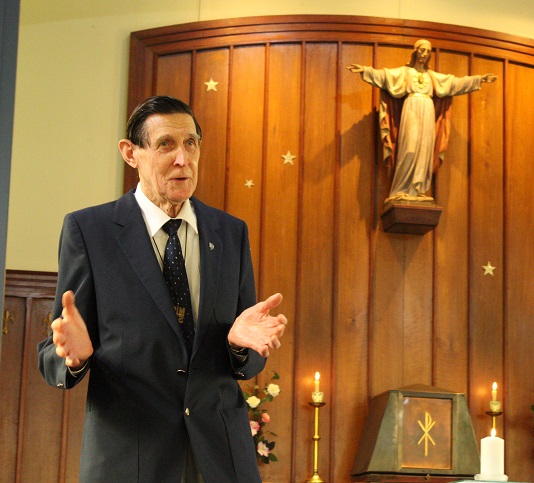
And, for three years, 2019-2022, he was Novice Master at Douglas Park where he now lives.
